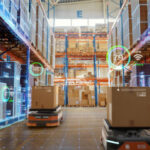In the fast-paced global economy, the logistics sector plays a pivotal role in ensuring the seamless movement of goods from manufacturers to consumers. As the backbone of supply chains, logistics involves the intricate coordination of various processes, including transportation, warehousing, and distribution. In this article, we will delve into the dynamics of the logistics sector, its challenges, and the innovations shaping its future.
The logistics sector is a multifaceted industry that encompasses a wide range of activities. From managing inventory and order fulfillment to optimizing transportation routes, logistics professionals work tirelessly to streamline operations and reduce costs. With the rise of e-commerce and globalization, the demand for efficient logistics solutions has never been higher.
One of the primary challenges faced by the logistics sector is the need for real-time visibility and transparency. Companies are increasingly adopting advanced technologies such as GPS tracking, RFID, and blockchain to monitor the movement of goods throughout the supply chain. These innovations not only enhance visibility but also contribute to improved efficiency and security.
The environmental impact of logistics operations has also come under scrutiny in recent years. The industry is actively exploring eco-friendly alternatives, including electric vehicles, sustainable packaging, and optimized route planning to minimize carbon emissions. Governments and businesses alike are recognizing the importance of adopting sustainable practices in logistics to address climate change concerns.
In the dynamic and interconnected global economy, the logistics sector stands as the linchpin that ensures the seamless flow of goods from manufacturers to consumers. Far more than just the movement of products, logistics involves a complex orchestration of processes, encompassing transportation, warehousing, distribution, and supply chain management. In this comprehensive exploration, we will delve into the intricate dynamics of the logistics sector, examining its challenges, innovations, and the transformative trends shaping its future.
The logistics sector operates at the nexus of various industries, serving as the engine that powers supply chains worldwide. The advent of e-commerce and the globalization of trade have exponentially increased the demand for efficient and agile logistics solutions. From managing inventory and order fulfillment to optimizing transportation routes, logistics professionals are at the forefront of ensuring that goods reach their destinations on time and in optimal condition.
One of the foremost challenges facing the logistics sector is the need for real-time visibility and transparency. As supply chains become increasingly complex, companies are adopting advanced technologies to monitor and trace the movement of goods throughout the entire logistical journey. Innovations such as GPS tracking, Radio-Frequency Identification (RFID), and blockchain are instrumental in providing the transparency required for efficient decision-making, risk management, and security.
The environmental impact of logistics operations has come under intense scrutiny in recent years. Acknowledging the carbon footprint associated with transportation and distribution, the industry is actively seeking eco-friendly alternatives. Electric vehicles, sustainable packaging, and optimized route planning are just a few examples of how the logistics sector is working towards reducing its environmental impact. Governments and businesses are aligning their strategies with sustainability goals to address climate change concerns and promote greener logistics practices.
Automation and artificial intelligence (AI) are heralding a new era in logistics. Autonomous vehicles, robotics, and predictive analytics are becoming integral components of modern logistics operations. Automated warehouses, equipped with robotic systems for order picking and packing, enhance efficiency and reduce the risk of errors. Predictive analytics, powered by AI, enable companies to anticipate demand fluctuations and optimize inventory levels, contributing to a more resilient and adaptive supply chain.
Conclusion
As we peer into the future, the logistics sector is on the cusp of unprecedented transformation. The integration of emerging technologies, coupled with a steadfast commitment to sustainability, will define the trajectory of logistics in the coming years. The evolution of e-commerce, coupled with the growing awareness of the environmental impact of logistics, positions this sector as not only dynamic and essential but also pivotal to the overall resilience and sustainability of the global economy.







